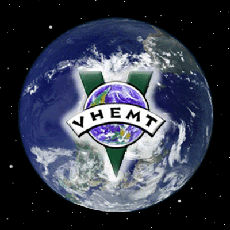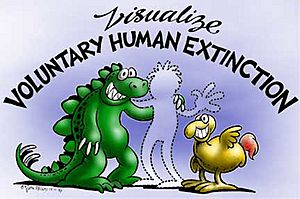Voluntary Human Extinction Movement facts for kids
 |
|
| Formation | 1991 |
|---|---|
| Type | NGO |
|
Founder
|
Les U. Knight |
The Voluntary Human Extinction Movement, also known as VHEMT, is an environmental group with a unique idea. It suggests that people should voluntarily choose not to have children. The goal is for the human population to slowly and peacefully disappear over time.
VHEMT believes that this would be the best way to protect the Earth's environment. The group points out that human activities can harm nature. They say that a smaller human population would reduce suffering for both people and animals. VHEMT often mentions the extinction of animal species and the overuse of natural resources as reasons for its views.
The movement was started in 1991 by Les U. Knight, an American activist. He became very involved in the environmental movement in the 1970s. He came to believe that human extinction was the best solution for the planet's problems. Knight runs the group's website and acts as its main spokesperson. VHEMT spreads its message through its website and media coverage.
Many people find the idea of human extinction to be very extreme. However, some agree with the idea of slowing down population growth. Critics of VHEMT argue that humans can learn to live in ways that don't harm the planet. They also say that the natural desire to have children will likely prevent people from ever choosing extinction.
Contents
History of the Movement
The Voluntary Human Extinction Movement was founded by Les U. Knight. He was a high school substitute teacher from Portland, Oregon. During the 1970s, as a college student, Knight joined the environmental movement. He concluded that many of the planet's problems were caused by human overpopulation. He joined a group called Zero Population Growth and decided not to have children himself.
Over time, Knight developed the idea that the best way to solve Earth's environmental issues was for humanity to become extinct. He believes that other people throughout history have had similar thoughts.
In 1991, Knight started a newsletter for VHEMT. In it, he encouraged people to help his cause by not having children. The movement also used cartoons to share its message. One comic strip showed a woman who decides to adopt a bonobo (a type of ape) instead of having a baby. In 1996, Knight launched a website for VHEMT, which by 2010 was translated into 11 languages. The VHEMT logo shows the letter "V" and a picture of the Earth turned upside down.
Organization and Promotion
VHEMT is not a formal organization with a list of members. Instead, it is a loose network of people who share the same ideas. Knight has said that anyone who agrees with the movement's philosophy can be considered a member.
Knight represents VHEMT at environmental conferences and other events. He uses these opportunities to talk about the effects of population growth. However, the movement's message has mostly been spread through news articles and television reports. VHEMT also sells items like buttons, T-shirts, and bumper stickers with slogans like "Thank you for not breeding".
Core Beliefs of the Movement
Why VHEMT Supports Extinction
The main argument of VHEMT is that the human population is too large for the Earth to support. Les U. Knight believes the best thing for the planet's biosphere (all living things) is for humans to stop reproducing. He says that human existence harms the environment in a way that will eventually lead to our own extinction, along with many other species.
According to Knight, most human societies have not lived in a way that is sustainable. He argues that even trying to live an "eco-friendly" lifestyle doesn't change the fact that humanity's presence has been destructive to the Earth. He promotes voluntary extinction as a way to prevent the suffering of people and the extinction of other animals.
A Choice, Not a Requirement
VHEMT believes that people should stop having children by their own choice. The movement is against any government programs that would force people to stop reproducing. Knight thinks that forcing people would not work in the long run.
He suggests that people who want to care for children could choose adoption or foster care. He believes that if people stopped focusing on having their own children, they would use their energy for other positive things.
Protecting Nature and Animals
Knight believes that the Earth's animals and ecosystems have a greater value than human creations, like art or science. He argues that species at the top of the food chain, like humans, are less important than species at the bottom. His ideas are influenced by a philosophy called deep ecology, which gives high value to all living things.
He points out that human extinction will happen eventually. He thinks it would be better for it to happen sooner, so we don't cause the extinction of more animal species. He also sees it as a way to allow new forms of life to evolve on Earth.
See also
 In Spanish: Movimiento por la Extinción Humana Voluntaria para niños
In Spanish: Movimiento por la Extinción Humana Voluntaria para niños
- Antinatalism
- Carrying capacity
- Childfree
- Negative Population Growth
- Object-oriented ontology
 | James Van Der Zee |
 | Alma Thomas |
 | Ellis Wilson |
 | Margaret Taylor-Burroughs |


